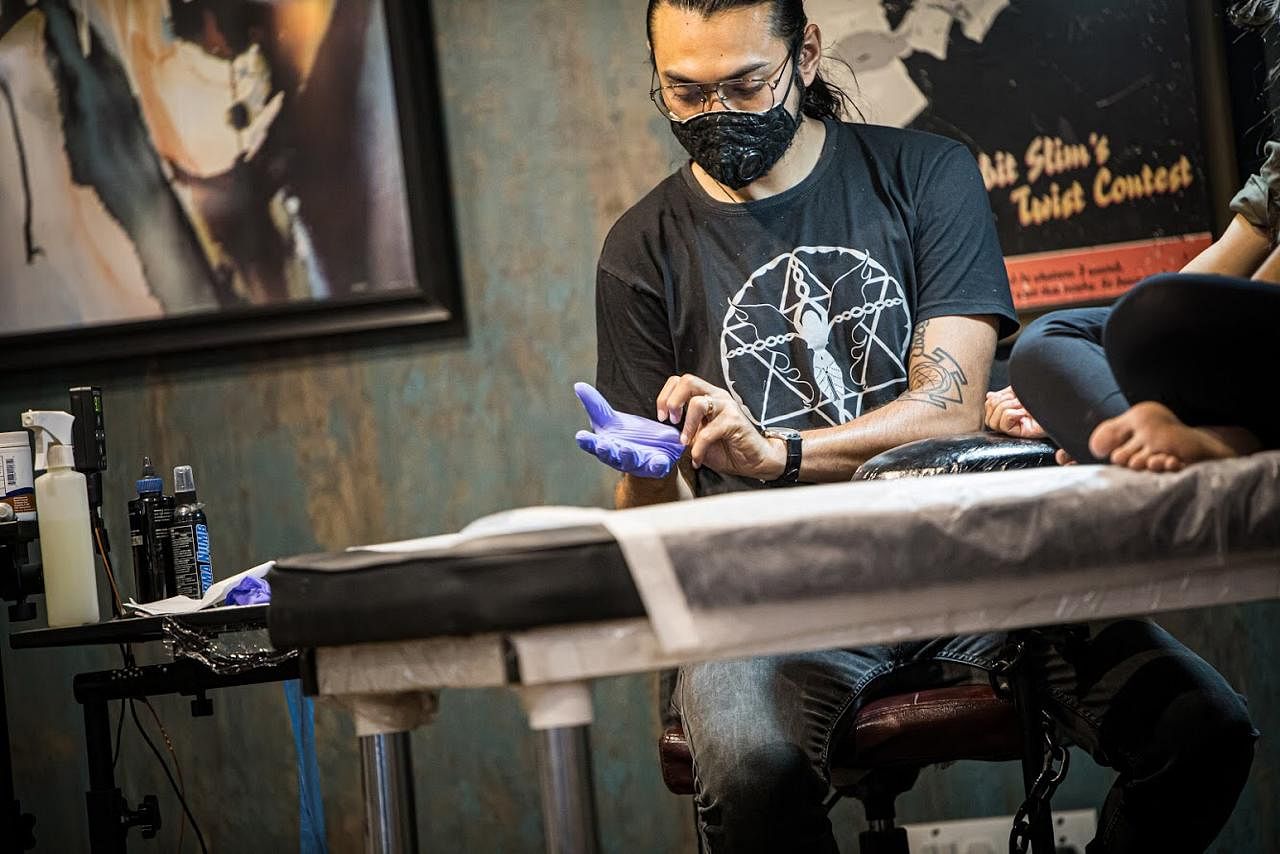
Four months into Covid-19 shuttering most parts of Bengaluru, the pandemic continues to leave an indelible mark on the livelihoods of its citizens. The exodus of migrants, the most palpable consequence of India’s lockdown, was perhaps one of the biggest cues to the catastrophic loss — both monetary and otherwise — that lay ahead.
While the nature of the spread of the virus and how social distancing works in practical terms are still under scrutiny, one thing is certain — the image of a post-pandemic world must incorporate six feet of separation.
Work has increasingly moved from the corporeal to the digital spectrum and professions like tattooing, which cannot move to a contact-less form have taken a massive hit during the lockdown.
Check out this story in an all-new format
Bengaluru’s tattoo studios and artists, as popular across the country as the city’s pubs and IT companies, have borne the brunt of the pandemic as the nature of the form and social distancing do not go hand in hand.
Tattoo studios reported a drop of up to 90% in monthly revenue as they cancelled walk-ins entirely to minimise risks.
Navin Kumar of Irezumi, a tattoo studio in Indiranagar, said that most customers were waiting for the tide to pass before they got inked because it wasn’t an urgent need. He said that they discouraged people from getting tattoos done during the lockdown in the interests of safety of customers and artists.
On the other hand, Ritopriyo Saha of Koramanagala's Trippink Tattoos said that they did have people come in despite the lockdown and fears of virus spread, especially those who wanted to commemorate a special occasion. He recounted a special moment when someone who lost their mother to Covid-19 came in for a tattoo dedicated to her.
Suresh Machu of Machu Tattoos noted that posting videos of safety measures and showing clients the precautions they were taking helped some overcome fears, to an extent. He added that some customers felt that the lockdown was good for post-tattoo maintenance as they had time to themselves and were mostly at home.
The nationwide lockdown also spurred some to look inward as isolation and confinement became state-imposed and imperative. Skin Deep, another popular tattoo studio in Indiranagar, said that they increasingly saw people getting tattoos around the theme of freedom and breaking free, such as a woman reaching out to the galaxy or a universe folded into a piece of paper.
This notion was echoed by Ritopriyo, who said that several customers requested designs around existential motifs such as extinct birds and animals, a reminder of the insignificance of humans in the face of nature.
The virus didn’t just bring on gloom. People also wanted dedicated Covid-19 tattoos as bodily emblems to remind them of an unforgettable time for years to come when masks would stop being in vogue.
Suresh of Machu Tattoos shared some unique client requests, such as the image of a sanitiser bottle pushing away the virus or a representation of the coronavirus wearing a mask. He said they also designed a tattoo of people sharing a kiss with masks, an expression of changing intimacy in a post-pandemic world.
Irezumi's Navin said they turned down several clients who asked for coronavirus designs to be inked on necks or bodies, requesting them to rethink whether they really wanted such reminders.
Looking to the future, Skin Deep said that they expected their clientele to return because tattoos might become even more meaningful after the horror of what the year had brought. It might be a while before that happens, however. The bat cave-like studio that's usually packed with people on the weekends now has a sign that requests people who might have come into contact with likely infected people to stay away.
The others also said that they received several enquiries and appointment bookings. However, the proximity inherent in the art form did make people think twice about it. Fuller body tattoos or those that require more than one sitting have significantly reduced, Ritopriyo said. He noted that people were wary of whom to trust, resulting in many last-minute cancellations.
The precise extent of Covid-19 risk in tattooing is yet to be ascertained. It can be safely stated, however, that the 'close contact' nature of the profession makes people susceptible to infection. There's an added risk because clients expose themselves to artists who might be meeting multiple people in a day or week, which could facilitate a spread.
Even before the virus put hygiene at the forefront of everything, tattoo studios have been known to emphasise sanitisation and sterile environments. Covering faces, sterilising workstations and equipment are routine practices for most tattoo artists.
With Covid-19 fears in the air, even more stringent hygiene practices have been put in place. Artists now use face shields alongside masks, foot covers, disposable sheets and do most consultations digitally or over the phone. Studios cater to clients an appointment basis and note complete details of the person, to ensure smoother contact tracing if required. Guests are also advised to come unaccompanied to prevent gatherings and temperature checks are done for each customer. Some studios have also employed ultraviolet-C sterilisation.
As business remains sparse, artists are taking this time to hone their skills, practise alone and bond with peers virtually. Trippink's studio serves as an alternate space for performance art and screenings. Ritopriyo said they were considering moving such programmes online. Others said they were taking this time to work on client requests, which will be fulfilled in the less socially distant days to come.
Most of the studios also train budding artists and they've now have moved to online teaching models.